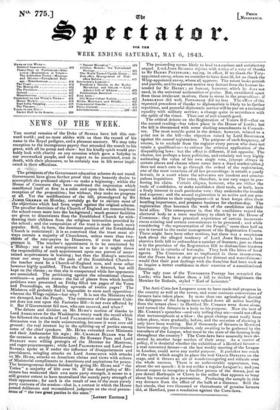The proceeding seems likely to lead to a curious and
satisfactory sequel. Lord Jona Russei.c rejoins with notice of a vote of thanks to Sir HENRY POTTINGER ; saying, in effect, If we thank the Tory- appointed envoy, whom we consider to have done ill, let us thauk the Whig-appointed envoy, whom all approve. The retort looks pettish and puerile, and its apparent motive may detract from the honour in- tended for Sir HENRY; an honour, however, which he does not need, in the universal acclamation of praise. But, considered apart from these irrelevant motives, there is sense in the proposition : if Asamorros did well, POTTINGER did no less The effcct of the repeated precedent of thanks to diplomatists is likely to be further repetition, and peaceful diplomatic service will be put on a technical equality with military service; a change quite in accordance with the spirit of the times. Thus out of evil cometh good. The critical debate on the Registration of Voters Bill—that on the second reading—has taken place in the House of Lords; but the bill is threatened with some slashing amendments in Commit- tee. The most notable point in the debate. however, related to a point not in the bill—the objection raised by Lord BROUGHAM against the annual registration. The purpose of such frequency, of course, is to exclude from the register every person who does not retain a qualitication--to enforce the strictest application of the disqualifying laws: but the effect is different, if not opposite. The elector, not perhaps a keen politician, and certainly not very highly estimating the value of his own single vote, (except always in certain places and classes where votes have a fixed market-price,) does not much care to go through the ordeal of the registration, one of the most vexatious of all law proceedings: it entails a yearly lawsuit, in a court where the advocates are insolent and unscru- pulous inquisitors. The voter, therefore, is not very eager in pre- ferring his claim. Certain cliques, however, who are either the tools of candidates, or make candidates their tools, or both, have a lively interest in each particular vote : they undertake the trouble and expense; and the annual registration is an active and not pro- fitless addition to their employment—it at least keeps alive their bustling importance, and prepares business for election-day. The registration thus becomes the' workof the candidates and their local allies. The consequence is, that the candidates regard the electoral body as a mere machinery to climb by to the House of Commons: they have practical experience of certain inconveni- ences existing and certain conveniences to be procured ; and while considering " the representation of the People," more than half an eye is turned to the easier management of the Registration Courts. There might have been other motives, but there was a suspicious look about the alleged tendency of Lord JOHN RUSSELL'S late abortive little bill to enfranchise a number of freemen ; just as there is in the provision of the Registration Bill to disfranchise trustees and to take in suburbs of boroughs. They look like hints of local agents. The Commons are so implicated in these manoeuvres, that the Peers have a clear ground for distrust and watchfulness : would that their past dealings with the franchise had been such as to inspire a better confidence in their exercise of a constitutional function.
The ugly case of the TOWNSHEND Peerage has occupied the Lords; who have before them a bill to declare illegitimate the Member for Bodmin, styled " Earl of Leicester."


























